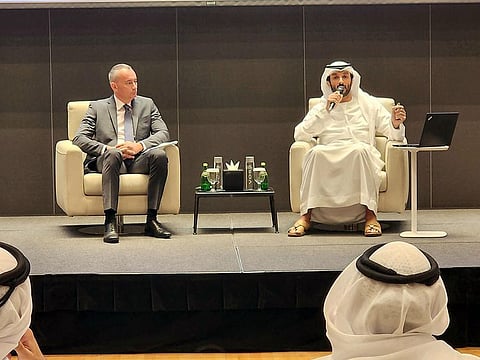UAE calls for multilateralism, trust in a fragmented world in order to combat global challenges
Abdullah Al Marri urges economic diplomacy, highlights UAE openness policies

Abu Dhabi: The world is currently experiencing one of its greatest levels of geoeconomic fragmentation in the modern era, with $12 trillion (Dh44 trillion) at risk of being wiped off the global GDP each year, says a top UAE official.
Amid this atmosphere of mistrust, the UAE is striving to bring back multilateralism and international cooperation in order to combat global challenges, Abdullah Al Marri, UAE Minister of Economy, said in the capital on Tuesday.
“We are living in an era in where there are trade tensions, technology and semiconductor flow barriers, rise and global surge in new trade restrictions, and Ukraine war-related disruptions in food, tech and energy flows. This means that there will be a shock on trade policy and uncertainty, reducing investment by 3.5 per cent. It will also decrease gross domestic product by 3.5 per cent, and increase unemployment by one per cent,” Al Marri said.
UAE approach
“In the UAE, we have an approach to adapt. I am not a big advocate of fragmentation, and I wouldn’t say that we find opportunities in fragmentation. In fact, openness is a national priority, and UAE President, His Highness Sheikh Mohamed Bin Zayed Al Nayan, mentioned this in his first presidential address in July 2022,” the minister said.
He was speaking at the Anwar Gargash Diplomatic Academy during a session that explored the importance of economic diplomacy. Attended by multiple diplomats, students and professionals, the session called for a return to multilateralism and systems of cooperation.
Risks of fragmentation
Al Marri, who has served as Minister of Economy since July 2020, highlighted how the impact of fragmentation is not equally distributed, with adverse effects concentrated on people in emerging economies, firms with high debt, the poor and most vulnerable, and small economies that rely on trade.
In addition to exacerbating financial insecurity, fragmentation also hinders climate action, and prevents solutions to other global challenges.
“Geoeconomic fragmentation has been on the rise for almost a decade, and the COVID-19 pandemic and the war in Ukraine only accelerated some already-established trends. But do we really want to live in a fragmented world?” he questioned.
Need for diplomacy
Al Marri held up economic diplomacy as a major tool to countering fragmentation.
“The UAE, for instance, is steering global talks and advancing climate action. We are hosting COP28 this year, as well as the World Investment Forum in October. And next year, we will host the 13th World Trade Organisation Ministerial Conference. These bring international multilateralism back into discussion. The UAE is putting huge effort to bring back multilateralism in order to combat global challenges,” the minister said.
“Economic diplomacy can really build bridges with other nations, promote dialogue and cooperation, and help address common challenges. For instance, the US-China agreement in 2015 led to the adoption of the Paris Agreement [to combat climate change]. Economic diplomacy can ensure that trade remains an engine of growth. An example is the concession that led to the adoption of the Geneva Package at the World Trade Organisation’s 12th Ministerial Conference last year despite extreme geopolitical tensions. Economic diplomacy also relies on soft power, and countries are using culture, education and other non-economic factors to advance their interests in a fragmented world,” he added.
New laws
In addition, the UAE has also opened itself up to investment and talent, as evidenced by its full foreign owenership laws, and its introduction of green and golden visas to attract and retain talent. It is also setting up closer economic partnership agreements (CEPAs) with other economies, and prioritising competition within its own economy.
“Research has shown that the change in foreign ownership law has led to more than 170 per cent increase in new business licenses in Dubai. This shows that new laws inject growth into the economy,” Al Marri said.
“We have been working on increasing competition in the UAE economy. We have a competition law that was issued in 2012, and we are looking at revisiting it. We have a new draft law to come up soon. Competition is important because with the opening of the economy, and international trade, there should not be monopolies. For instance, when Uber bought Careem, it created a few millionaires, but in the economy, it created a monopoly with high prices. Competition for us is really big for us [now],” he added.
The nation has also signed bilateral free trade agreements or CEPAs with India, Israel and Indonesia, with more agreements due to be announced this year.
Cooperation necessary
Advocating for multilateralism, the minister said it is a system that is needed now more than ever before.
“Multilateralism was created at a time of chaos in the wake of the Second World War, when the world was facing lots of political and economic challenges. Today, we need multilateralism even more. With the fragmentation and weakening of the international multilateral system, the world is experiencing new unilateral and bilateral approaches. In fact, over the past two weeks alone, we have seen the Saudi Arabia-Iran agreement in China, the Turkiye-Iran heads of state visits to Russia, the Egypt-Turkiye meetings after 10 years, Iran and Syria visits to the UAE, and the China-Russia summit in Moscow. We’ve seen a lot of bilateral meets happening in a very fragmented world,” he said, offering hope.
Diplomat role
The minister called on future diplomats to look towards solving global challenges, and to be agile in a world where ‘black swan’ events have become the norm.
“Future diplomats must be agile, be able to adapt to new circumstances, and be problem solvers. They must also be able to solve global challenges, not just challenges of the country [they are stationed in],” he told the assembled AGDA students.



